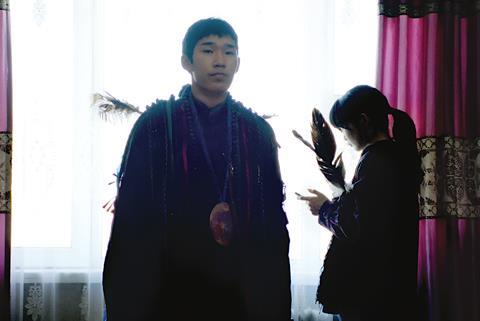A 17 year-old shaman comes of age in this remarkably-assured debut feature from Mongolia

Dir. Lkhagvadulam Purev-Ochir. France/Mongolia/Portugal/Netherlands/Germany/Qatar. 2023. 104 mins
Since the 1990s, Mongolia has undergone a gradual process of modernisation that has inevitably brought about significant changes to its political, economic and education systems, not to mention the lifestyles of its citizens. A perhaps surprising response to the country’s capitalist trajectory has been the revitalisation of folk religion, specifically Tengrism, which worships natural phenomena. When in need of spiritual guidance, Mongolians will consult shamans who enter a trance to communicate with deities on their behalf. Lkhagvadulam Purev-Ochir’s delicately composed first feature focuses on a teenage shaman whose ability to help others is hindered by his own growing pains. As signalled by its title, City of Wind tells this coming-of-age story within the context of a society that is now predominantly urban yet maintains strong ties to the traditions forged through a nomadic way of life.
The film’s occasional evocations of the spiritual plain resolutely grounded in the everyday.
City Of Wind has been selected for the Horizons Competition at Venice with an engagement in the Centrepiece programme of the Toronto International Film Festival to follow. Purev-Ochir already has a notable track record at both events: her short film Snow in September (2022) won the Orizzonti award for Best Short Film at Venice and the Best International Short Film award at Toronto. City of Wind should also be warmly received on the festival circuit, especially given it offers an accessible portrait of a country in transition. Its youthful perspective on contemporary Mongolian society could well attract an appreciative crowd in speciality theatrical release before piquing further interest on streaming.
The opening scene finds a shaman summoning “Grandpa Spirit” to reassure an elderly neighbour (Myagmarnaran Gombo) that his errant son will change his ways. Wearing a headdress adorned with long hair that conceals his face, the shaman has the hoarse voice and manner of a senior practitioner. But when the mask is removed, we encounter 17-year-old Ze (Tergel Bold-Erdene) who balances his spiritual responsibility to his community with the academic rigours of high school.
Disruption occurs when he performs a ritual for Maralaa (Nomin-Erdene Ariunbyamba), a young woman who is about to undergo heart surgery. Maralaa scoffs at the notion that Ze will “carry” her life during the operation and dismisses him as a “con man”. Yet this forthright client stirs something in the socially awkward young shaman. He visits her in hospital and romance blossoms. Ze is soon dyeing his hair blonde, consuming alcohol in nightclubs getting into trouble at school. This may be typical teenage behaviour, but for one who is a shaman, it’s especially risky.
This highly accomplished feature debut sees Purev-Ochir striving for an honest depiction of people and place by sensitively illustrating the uncertainties facing Mongolia’s Generation Z, which is now the country’s largest demographic. To this end, the fresh-faced Bold-Erdene is a real find who naturalistically conveys Ze’s identity crisis. In the early stages, he projects a genuinely self-effacing timidity and maintains a certain innocence when Ze tries on a rebellious persona. Unobtrusive editing by Matthieu Taponier accentuates the believably halting rhythm between Bold-Erdene and the similarly unaffected Ariunbyamba as their characters forge a connection despite, or because of, their different outlooks. Narrative conventions and the generally sombre tone indicate that the central bond will be fleeting, but quietly expressive performances ensure there is little sense of contrivance.
This courtship plays out around the Mongolian capital of Ulaanbaatar during winter with Purev-Ochir providing a tour that extends from a communist-era propaganda monument to a luxury shopping mall. Since it’s a city with a curious blend of past and present, urban wandering provides a backdrop for the central couple to articulate their own contradictions: Ze believes deeply in Tengrism, but also enjoys window shopping and fantasises about moving into a modern apartment; Maralaa has less regard for traditional values, yet is taken with the idea of living in the grasslands. As is often the case with films that foreground teenage awakening, they end up in a nightclub, but the strobe-lit dancefloor doesn’t become the anticipated space of transcendent connection. Ze is conspicuously out of place amongst the party crowd while the coldly pulsating beats note his spiritual deadening.
Eschewing the exotic, Purev-Ochir and cinematographer Vasco Viana have opted for a washed-out palette that emphasises Mongolia’s industrialisation with elements that could be utilised for phantasmagoric effect (countryside vistas, ritualistic clothing) remaining subdued throughout. Nonetheless, landscape plays an important role in their illustration of contrasting realities. There are a number of effective juxtapositions: the grey Ulaanbaatar skyline and the rugged natural outskirts; an apartment complex surrounded by fake neon trees and the hardscrabble yurt (tent-like) district on the perimeter of the city where Ze’s family resides.
The matter-of-fact approach extends to its position on shamanism. Through Ze’s touching interactions with his troubled neighbours, the practice is depicted in practical terms as a sorely needed form of moral support at community level. Floating overhead shots set to Vasco Mendonca’s ethereal electronic score lend an air of mysticism, but there is a rough texture to these images that keep the film’s occasional evocations of the spiritual plain resolutely grounded in the everyday.
Production companies: Aurora Films, Guru Media, Uma Pedra no Sapato, Volya Films, 27 Films Production
International sales: Best Friend Forever, sales@bffsales.eu
Producers: Katia Khazak, Charlotte Vincent
Screenplay: Lkhagvadulam Purev-Ochir
Editing: Matthieu Taponier
Cinematography: Vasco Viana
Music: Vasco Mendonca
Main cast: Tergel Bold-Erdene, Nomin-Erdene Ariunbyamba, Bulgan Chuluunbat, Ganzorig Tsetsgee, Tsend-Ayus
























